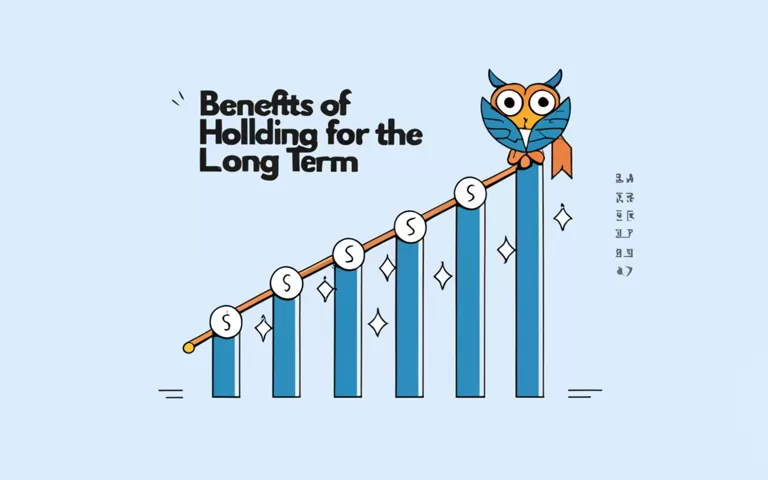Investing for the long term means holding onto investments like stocks, bonds, ETFs, and mutual funds for more than a year. This strategy requires patience and discipline, as investors must be prepared to weather market fluctuations while aiming for higher rewards over time. Let’s explore why holding stocks for the long term can be a smart move for building wealth.

Key Takeaways
- Higher Returns: Long-term stock investments typically outperform short-term trades.
- Reduced Emotional Trading: Staying invested can prevent emotional decisions that harm returns.
- Positive Historical Performance: The S&P 500 has consistently provided positive returns over most 20-year periods.
- Cost Efficiency: Long-term investing reduces transaction fees and capital gains taxes.
- Compounding Benefits: Reinvesting dividends can significantly boost returns.
Better Long-Term Returns
Different asset classes, like bonds and equities (stocks), have varying performance levels. Historical data shows that stocks generally outperform other asset classes over the long term. For instance, from 1928 to 2023, the S&P 500 achieved an average annual return of 9.80%, compared to 3.30% for three-month Treasury bills and 6.55% for gold.
Riding Out Highs and Lows
Stocks are known for their volatility, with prices sometimes dropping 10% to 20% or more in short periods. However, holding stocks long-term allows investors to ride out these fluctuations. Over a 20-year period, the S&P 500 has rarely resulted in losses, even considering major economic setbacks like the Great Depression and the financial crisis.
Reduced Emotional Trading
Emotional trading can significantly impact investor returns. Many investors panic and sell when the market drops, missing out on potential rebounds. Studies show that the average equity fund investor earned 6.81% annually over 30 years, compared to the S&P 500’s 9.65%, largely due to emotional trading decisions.
Lower Capital Gains Tax Rate
Capital gains taxes are lower for long-term investments. Selling assets held for over a year incurs a maximum tax rate of 20%, compared to up to 37% for short-term gains. This tax efficiency makes long-term investing more attractive.
Cost-Effective Strategy
Long-term investing is more cost-effective as it minimizes transaction fees. Frequent trading incurs commission fees and markups, which reduce overall returns. Holding investments for longer periods also reduces the impact of ongoing account maintenance fees.
Benefit From Compounding With Dividend Stocks
Reinvesting dividends from blue-chip or defensive stocks can significantly increase portfolio value over time. Compound interest on these reinvested dividends leads to exponential growth, enhancing long-term returns.
Best Types of Stocks to Hold for the Long Term
Choosing the right stocks depends on factors like age, risk tolerance, and investment goals. Here are some recommendations:
- Index Funds: ETFs tracking indexes like the S&P 500 or Russell 1000 offer diversified, cost-effective investments.
- Dividend-Paying Stocks: Reinvesting dividends can add significant value to your portfolio.
- High-Growth Companies: These stocks offer higher returns but come with increased risk.
Frequently Asked Questions (FAQs)
What Are the Tax Benefits of Holding a Stock Long Term?
Long-term investments are taxed at lower rates (0%, 15%, or 20%) compared to short-term gains, which can be taxed up to 37%.
How Long Do You Have to Hold a Stock for It to Be Considered Long Term?
A stock must be held for at least 12 months to qualify as a long-term investment.
Can You Sell a Stock Right After Buying It?
This depends on your broker’s rules. Some require holding stocks until the settlement date, while others allow same-day transactions within certain limits.
Conclusion
Holding stocks for the long term is a proven strategy for building wealth. It allows you to ride out market volatility, reduces emotional trading, and benefits from lower taxes and compounding dividends. By choosing the right mix of stocks and maintaining a disciplined approach, you can achieve your retirement savings goals and secure your financial future.
Willie McClellan is a financial analyst and personal finance expert with over 15 years of industry experience. Holding a Master’s degree in Finance from the University of Chicago, Willie has worked with top investment firms, providing insights on market trends and investment strategies. He is passionate about financial education and regularly contributes to leading financial blogs and magazines. When not working, Willie enjoys hiking and spending time with his family.



